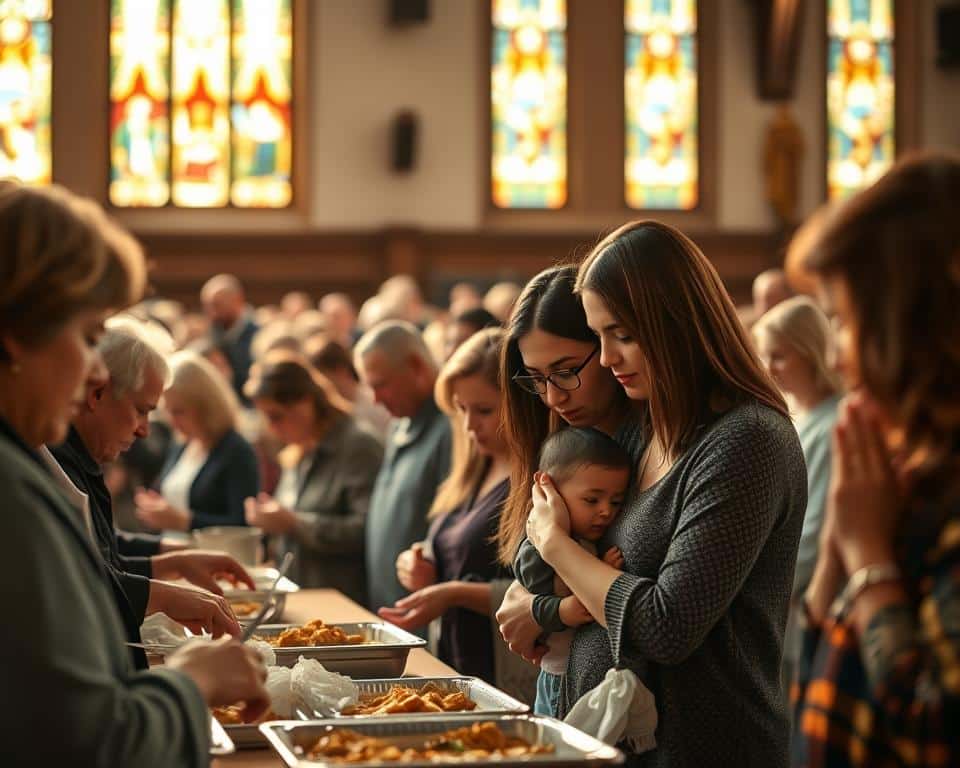“Faith is taking the first step even when you don’t see the whole staircase.” —Martin Luther King Jr. This powerful truth reminds us that faith isn’t just a belief—it’s action. For many, Christianity is more than Sunday worship; it’s a daily walk grounded in Scripture and love.
The Christian faith calls us to reflect God’s truth in everyday life. Whether through kindness, prayer, or service, small steps build a meaningful journey. Stories like Alissa Brinkman’s show how Biblical principles transform lives when applied consistently.
This guide shares 15 practical methods to help you grow closer to Christ. Progress, not perfection, is the goal. Let’s explore how to make faith a natural part of your decisions and relationships.
Start Your Day with God
Morning moments with God shape the entire day. A simple routine centered on Scripture and prayer builds a foundation for clarity and peace.

Begin with prayer or devotion
Try the ACTS method: Adoration, Confession, Thanksgiving, Supplication. Nurse Alissa Brinkman prays this way before patient consultations. Her day flows from God’s presence.
Meditate on Scripture
Keep a Bible near your coffee maker or bedside. Highlight one verse to reflect on. For example, Psalm 143:8: *”Let the morning bring me word of your unfailing love.”*
Set a phone alarm with a verse reminder. Even five minutes of focus aligns your plans with God’s truth.
Practice Gratitude Daily
Gratitude turns ordinary days into blessings. When we recognize God’s hand in simple things, our heart overflows with joy. Psalm 118:24 reminds us:
*”This is the day the Lord has made; let us rejoice and be glad in it.”*

Keep a Gratitude Journal
Try this: Each morning, write down three blessings and one Scripture. It could be sunshine, a kind word, or a meal. Over time, this habit rewires the heart to see God’s goodness every day.
Share Blessings with Others
At home or the workplace, voice thankfulness. Say “I appreciate you” to a cashier or share gratitude during family dinners. Small acts become a way to reflect Christ’s love.
Warning: Avoid comparing your life to others. Focus on what you have, not what’s missing. Even hard days hold hidden gifts.
Serve Others with Love
True faith shines brightest when we serve those around us. Jesus modeled this by washing feet and feeding crowds. His words in Matthew 25:40 remind us:
*”Truly I tell you, whatever you did for one of the least of these, you did for me.”*
Volunteer in Your Community
Local needs are everywhere. Food banks, nursing homes, and literacy programs welcome helpers. Alissa Brinkman spent four years assisting an elderly neighbor with groceries—even when they resisted at first.
Consistency matters more than scale. Try these ideas:
- Join church-organized food drives
- Read to kids at libraries
- Donate time to homeless shelters
Help a Neighbor in Need
Start close to home. Mow a lawn, babysit, or share a meal. These small acts reflect God’s love tangibly.
Alissa’s persistence with her neighbor eventually built trust. Like her, look for ways to quietly help others. Over time, these efforts weave community bonds stronger than words alone.
Build Strong Christian Relationships
God designed us to thrive in fellowship, not isolation. Scripture reminds us that faith grows deeper when shared with others. Whether through small groups or church events, these connections anchor us in truth and love.
Join a Small Group
Small groups offer accountability and prayer support. They’re a safe place to ask questions and grow. Try visiting three different groups before choosing one—each has a unique dynamic.
Alissa’s brother found hope in a men’s group during his cancer treatment. Their prayers and meals became lifelines. As Ecclesiastes 4:9–12 says:
*”Two are better than one… If either of them falls, one can help the other up.”*
Attend Church Activities
Your church likely hosts gatherings beyond Sunday services. Look for:
- Bible studies that unpack Scripture together
- Service projects to help your community
- Fellowship meals where people share life stories
These activities build relationships that last. They also reveal your place in God’s wider family. Start small—even a monthly commitment can change your perspective.
Study and Apply Scripture
God’s word is a lamp for every step we take. When we hide Scripture in our hearts, it reshapes our thoughts and choices. Alissa Brinkman, a nurse, shares how Psalm 139 reminds her patients of their worth—proof that God’s truth changes lives.
Memorize Key Verses
Storing Bible verses in your mind builds resilience. Try these simple methods:
- Index cards: Write verses on cards and review them daily.
- Phone apps: Use tools like ScriptureTyper for repetition.
- Sing it: Many verses set to music stick faster.
Alissa keeps Proverbs 3:5-6 on her clinic desk: *”Trust in the Lord with all your heart… He will make your paths straight.”*
Let the Bible Guide Decisions
Create a “decision filter” with questions like:
- Does this align with God’s word?
- Will it honor Christ?
- Does it reflect love for others?
For conflicts, Ephesians 4:29 offers clarity:
*”Do not let any unwholesome talk come out of your mouths, but only what is helpful for building others up.”*
5 Essential Verses for Daily Living:
- Joshua 1:9 (Courage)
- Philippians 4:6-7 (Peace)
- James 1:19 (Listening)
- Matthew 22:39 (Love)
- Psalm 46:10 (Rest)
Like Alissa, let Scripture be your compass. Small steps—memorizing, applying, sharing—turn God’s word into life-giving wisdom.
Live with Purpose and Intention
Intentional choices shape a meaningful Christian journey. Every decision—big or small—can reflect God’s truth when we align our hearts with His word. Start by asking: *Does this honor Christ?*
Align Actions with Faith
Colossians 3:23 reminds us:
*”Whatever you do, work at it with all your heart, as working for the Lord.”*
Try these steps to stay focused:
- Weekly self-check: Ask, “Did my choices reflect God’s love?”
- Financial stewardship: Tithe regularly and spend ethically.
- Time management: Prioritize prayer over busyness (Ecclesiastes 3:1).
Evaluate Priorities Regularly
Simplify things that distract from what matters. Here’s a quick checklist:
- What gives life meaning? (Hint: Matthew 6:33)
- Does my schedule leave time for serving others?
- Am I investing in relationships that point to Christ?
Faith is a journey, not a sprint. Small, purposeful steps lead to lasting change.
Extend Grace and Forgiveness
Grace transforms relationships when we let go of grudges and embrace healing. Forgiveness isn’t easy, but it’s central to Christ’s teachings. Ephesians 4:32 reminds us:
*”Be kind and compassionate to one another, forgiving each other, just as in Christ God forgave you.”*
Seek Forgiveness When Needed
Jesus gave clear steps in Matthew 5:23-24 for making things right:
- Admit the wrong: Name the hurt without excuses.
- Ask sincerely: “Will you forgive me?” shows humility.
- Make amends: Return what was taken or repair damage.
- Reconcile: Rebuild trust through consistent change.
Corrie ten Boom, a Holocaust survivor, forgave a guard who harmed her family. She later wrote: *”Forgiveness is an act of the will, and the will can function regardless of the temperature of the heart.”*
Offer Forgiveness to Others
True forgiveness doesn’t ignore harm but releases bitterness. Warning: Forgiving doesn’t mean staying in unsafe situations. Set boundaries while praying for the other person.
For tough relationships, pray Luke 6:27-28:
*”Love your enemies, do good to those who hate you, bless those who curse you, pray for those who mistreat you.”*
Journal Prompts to Process Hurt:
- What did this teach me about God’s love?
- How can I pray for the person who hurt me?
- What small step can I take toward healing today?
Learn more about the Christian approach to forgiveness in depth. Like Corrie, choose freedom—one prayer at a time.
Love Others as Jesus Did
Love in action speaks louder than words—just as Jesus showed us. He healed the sick, fed the hungry, and welcomed the overlooked. Today, we can follow His example through simple, intentional acts.
Show Kindness in Small Ways
Jesus noticed details: a widow’s coins, a disciple’s doubt. Like Him, we can love others through micro-kindness. Try these ideas:
- Leave encouraging notes on coworkers’ desks
- Bake cookies for a neighbor who’s lonely
- Pay for a stranger’s coffee or Diet Coke (like Alissa’s $5 ministry)
- Compliment someone sincerely—mention a specific strength
- Send a text: “Praying for you today”
These gestures take seconds but echo eternity. As 1 John 3:18 says:
“Let us not love with words or speech but with actions and in truth.”
Put Others’ Needs First
Philippians 2:3 challenges us: “Do nothing out of selfish ambition… value others above yourselves.” Here’s how:
- Listen without interrupting—set a timer for 5 minutes
- Offer to babysit for a single parent
- Donate time to a shelter or food pantry
Service projects vary by age:
- Kids: Pack blessing bags with socks and snacks for the homeless
- Teens: Tutor younger students after school
- Adults: Drive seniors to medical appointments
Warning: Serving others shouldn’t drain you. Jesus withdrew to pray (Luke 5:16). Balance love with rest—you can’t pour from an empty cup.
Whether through $5 gifts or listening ears, every act helps show God love. Start small, and let Scripture guide your ways.
Speak Up for Justice
Justice begins when we refuse to stay silent. Scripture urges us to defend the vulnerable, just as Proverbs 31:8-9 commands:
*”Speak up for those who cannot speak for themselves… defend the rights of the poor and needy.”*
Recognize and Defend the Marginalized
Oppression often hides in plain sight. Look for these signs:
- Exclusion: Someone repeatedly left out of groups.
- Hurtful words: Jokes targeting race, disability, or faith.
- Power imbalances: Bosses or teachers favoring certain people.
Esther’s courage in Esther 4:14 shows one way to act: *”Who knows but that you were made for such a time as this?”* Like her, use your voice—even if it feels risky.
Take Action Against Bullying
Schools are key battlegrounds. Try these tactics:
- Peer mentoring: Pair older students with younger ones.
- Reporting systems: Anonymously alert staff to unsafe behavior.
- Kindness campaigns: Post notes like “You belong” on lockers.
Confront bullying with truth and grace. Ask: “How would Jesus handle this?” Then act firmly but kindly.
Resources for Advocacy
Need help? These groups offer support:
- Christian Legal Aid: Free legal help for the oppressed (e.g., CLAclinics.org).
- Anti-Bullying Pro: School training programs (AntiBullyingPro.com).
Every small stand for justice can change a life. Start today—your courage matters.
Choose Words Wisely
Words carry power—they can heal or harm in seconds. Scripture reminds us that what we say reflects our hearts (Luke 6:45). Whether at home, work, or church, every conversation is a way to honor Christ or wound others.
Evaluate Your Speech
James 3 compares the tongue to a small spark that sets a forest ablaze. Before speaking, use the THINK test:
- True: Is this fact or assumption?
- Helpful: Will it build up or tear down?
- Inspirational: Does it point to hope?
- Necessary: Is silence better now?
- Kind: Would Jesus say this?
Jen, a teacher, practiced a week of intentional silence after harsh feedback. She learned listening often speaks louder than words.
Replace Negativity with Truth
Philippians 4:8 offers a filter: Focus on what’s true, noble, and praiseworthy. Try these swaps:
- Instead of complaining, say: “God’s got this.”
- Replace gossip with: “Let’s pray for them.”
Ephesians 4:29 sets the standard:
“Do not let any unwholesome talk come out of your mouths, but only what is helpful for building others up.”
Encourage Others Daily
Five Scripture-based phrases to uplift others:
- “You’re fearfully and wonderfully made” (Psalm 139:14).
- “God has a plan for you” (Jeremiah 29:11).
- “Your faith inspires me” (1 Thessalonians 1:3).
- “Let’s pray about this together.”
- “Thank you for being you.”
Small things—like a text or note—can change someone’s way of seeing their day. For more on respecting others, explore this guide.
Warning: Avoid joking about sensitive things. Even casual words can hurt. Pause, pray, then speak—it’s the Christlike way.
Pray for Those Around You
Prayer bridges the gap between heaven and earth in everyday moments. Whether for a coworker’s stress or a neighbor’s illness, lifting others to God transforms time into sacred space. Alissa Brinkman, a nurse, asks patients: *”May I pray with you?”*—and has never heard “no.”
Pray Together Openly
Simple prayers disarm hearts. Try these starters:
- For stress: “God, give peace that surpasses understanding (Philippians 4:7).”
- For healing: “Lord, restore strength as You promised in Isaiah 40:31.”
- For gratitude: “Thank You for [name], a gift in my life.”
- For guidance: “Lead us like You guided Moses (Exodus 13:21).”
- For unity: “Bind us in love, just as Colossians 3:14 teaches.”
Seek Divine Opportunities
Prayer walking merges action with intercession. Walk your block, whispering blessings for each home. Notice needs—a broken fence might mean a family needs encouragement.
James 2:26 reminds us:
“Faith without deeds is dead.”
Balance prayer with practical help. After praying for a lonely senior, offer to grocery-shop. When God prompts you, act.
Non-Verbal Prayer Ideas:
- Sketch or paint prayers (inspired by Psalm 19:1).
- Sing hymns as petitions.
- Pray silently in nature (Romans 1:20).
Like Alissa, let prayer be your first response—not last resort. Every whispered word plants hope in someone’s journey.
Share Your Faith Story
Your story of faith can light the path for others searching for hope. Revelation 12:11 reminds us:
“They triumphed by the blood of the Lamb and by the word of their testimony.”
Even imperfect stories reveal God’s grace. Start by structuring your testimony in three parts:
Tell Others What God Has Done
Before Christ: Describe your life without Him—struggles, emptiness, or searching. Keep it brief but honest.
During: Share how you met Jesus. Was it a crisis, a quiet moment, or a friend’s kindness?
After: Highlight changes—peace, purpose, or healing. Alissa Brinkman tells patients: *”I once feared failure, but now I trust God’s plan.”*
Be Open About Your Journey
Practice first with a small group or mentor. Alissa’s early attempts felt awkward—she once quoted Scripture to a skeptical coworker mid-surgery. Later, she learned to weave faith into conversations naturally.
5 Non-Threatening Starters:
- “What gives you hope during hard times?”
- “Have you ever felt a prayer was answered?”
- “I’ve been reading Psalm 23—what comforts you?”
- “How can I pray for you this week?”
- “Your resilience inspires me. What’s your secret?”
Your story doesn’t need drama to matter. A simple journey of growth can point others to Christ’s love. Start small—your words might be someone’s first step toward faith.
Help Those in Need
Compassion moves us beyond words into action—just as Jesus demonstrated. When we serve the poor and marginalized, we mirror His heart. Luke 12:33-34 urges:
“Sell your possessions and give to the poor… For where your treasure is, there your heart will be also.”
Support the Poor
Cornelius in Acts 10 modeled impactful giving. His prayers and alms reached heaven before Peter’s sermon. Try these practical ways to help:
- Time: Tutor kids at a Title I school
- Skills: Offer free car repairs to single parents
- Advocacy:
- Support housing policies for the homeless
- Volunteer at legal aid clinics
- Church benevolence: Many congregations run funds for rent/utility aid
Research charities on MinistryWatch.com to ensure integrity. Avoid enabling dependency—focus on empowerment like job training.
Give Generously
Generosity isn’t just about money. A neighbor might need:
- Rides to medical appointments
- Lawn care during a crisis
- Babysitting for exhausted parents
One church in Texas stocks a “blessing pantry” with non-perishables. Members take turns restocking it—an easy way to serve the community.
Warning: Set healthy boundaries. Give from abundance, not obligation. As Galatians 6:9 reminds us:
“Let us not become weary in doing good, for at the proper time we will reap a harvest if we do not give up.”
Keep Growing in Faith Every Day
Growth in faith is a daily choice, not a one-time event. Like a muscle, it strengthens with consistent practice. Start small—try a 30-day challenge: read one Proverb daily, pray for a neighbor, or journal God’s faithfulness.
Accountability fuels progress. Pair with a friend to share victories and struggles. C.S. Lewis once wrote: *”Every Christian is to become a little Christ.”* This journey lasts a lifetime.
Watch for stagnation: skipping prayer, neglecting Scripture, or avoiding church. These warn of drifting. Instead, join a small group to stay rooted. Your life reflects Christ best when you grow daily.
Ready to take the next step? Visit your local church or explore Bible studies. Every day offers new ways to deepen your walk with God.





